

 23.46°C काठमाडौं
23.46°C काठमाडौं
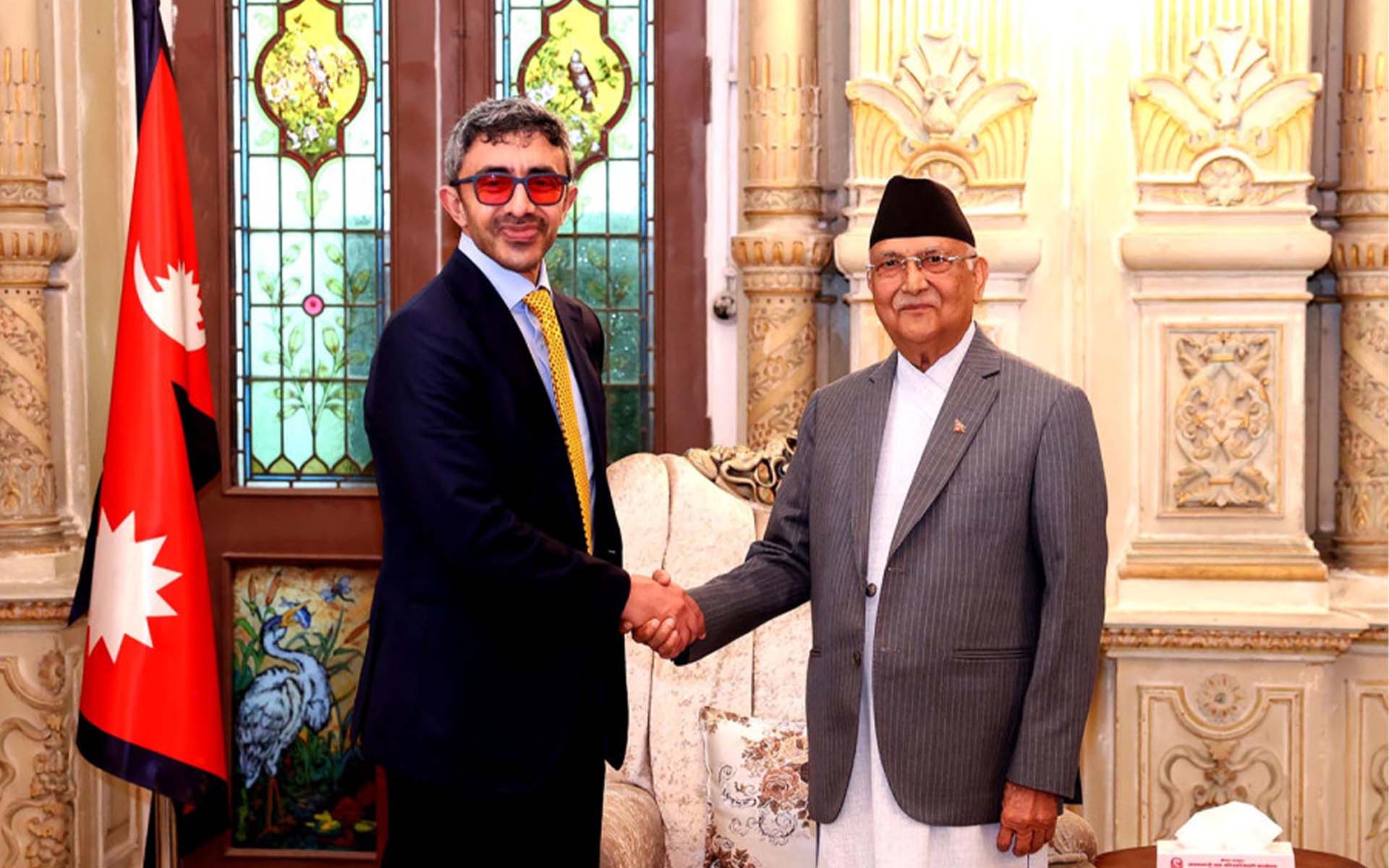
Nepal’s relationship with the Kingdoms of the Gulf has held strategic importance over the years. With over two million Nepali migrant workers residing in the six West Asian monarchies – Qatar, Saudi Arabia, the United Arab Emirates, Kuwait, Bahrain, and Oman – these countries remain central to Nepal’s employment security and economy.
In 2023 alone, remittances from the Gulf countries accounted for more than 26 percent of Nepal’s Gross Domestic Product. Recent data released by the Government of Nepal reveals that the country received more than Rs. 7 billion in remittances in the past six months. For a nation facing a large trade deficit and limited domestic income, remittances have significantly contributed to both Nepal’s national economy and the everyday lives of its people.
In the past, Nepal’s labor migration was primarily directed toward India, Malaysia, and the Gulf nations. However, in today’s multipolar world, countries like Qatar, Saudi Arabia, the UAE, Kuwait, Bahrain, and Oman no longer fit only the image of oil-rich economies. They now invest heavily across different global sectors and play a significant geopolitical role in the multilateral order.
Although the Gulf Cooperation Council (GCC) countries have historically been seen as foreign employment destinations, they are now emerging as key global donors and development partners. Nepal must, therefore, shift its approach towards the Gulf nations, as they now offer opportunities beyond labor migration, including increasing foreign investments across sectors.
Dr. Narad Nath Bharadwaj, former Ambassador of Nepal to Qatar, remarks that Nepal and the Kingdoms of the Gulf can emerge as strategic development partners in the days to come. “Nepal should pursue bilateral agreements with all GCC countries in areas such as tourism, hydropower, health, education, sports, culture, labor, investment, trade, and development cooperation. We must broaden our bilateral relationships beyond foreign employment,” says Bharadwaj. He also emphasized the importance of creating a conducive investment environment, stating, “Without a suitable environment, foreign investors will look elsewhere.”
While West Asia has long been characterized by uncertainty, the Gulf monarchies have built their image as zones of peace, security, prosperity, and development. In 1981, the GCC was established as a political and economic alliance to foster regional cooperation. Today, the Persian Gulf monarchies rank among the most affluent and influential states in the world. Despite occasional ups and downs, the GCC nations continue to move forward collectively to drive regional growth.
In recent years, we have witnessed increasing diplomatic attention from the Gulf to Nepal, marked by a series of high-level visits. Nepal has hosted dignitaries including the Emir of Qatar, the Deputy Prime Minister of the UAE, and foreign ministers from various Gulf states, reflecting deepening interest.
Country-Specific Considerations
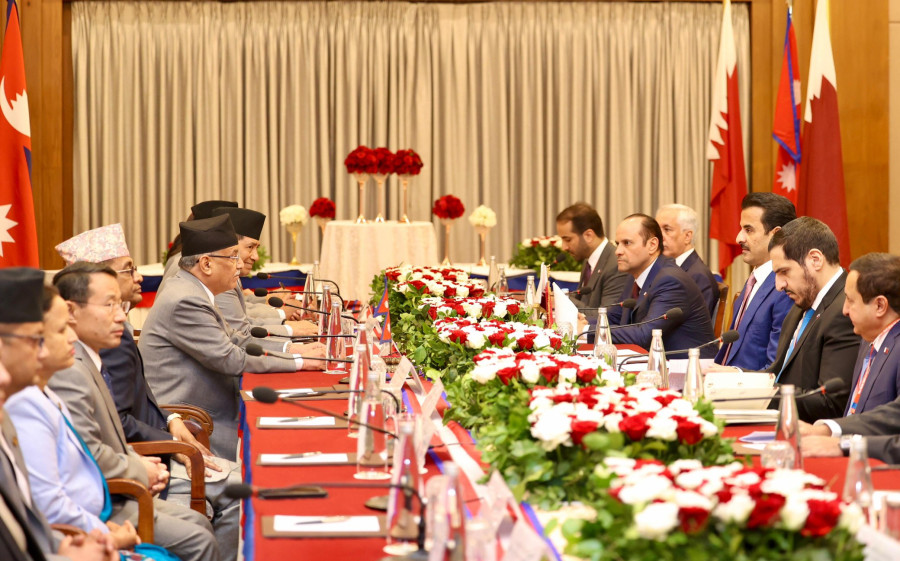
On April 23–24, 2024, marking the first high-level visit from a Gulf head of state, Nepal welcomed the Emir of Qatar, Sheikh Tamim Bin Hamad Al-Thani. The Emir’s visit elevated diplomatic ties between Nepal and Qatar, which were established on January 21, 1977. Nepal and Qatar signed one bilateral agreement and five Memorandums of Understanding (MoUs) following bilateral talks between Emir Al-Thani and the then Prime Minister of Nepal, Pushpa Kamal Dahal. The Qatari Emir also met with the President of Nepal, Ram Chandra Poudel, among other top officials.
Agreements were signed between the national news agencies and between the offices of the Attorneys General of the two countries. Other key MoUs included agreements on diplomatic training and collaboration in education, scientific research, arts, culture, and sports. Additionally, the Federation of Nepalese Chambers of Commerce and Industry (FNCCI) signed an MoU with the Qatar Chamber of Commerce.
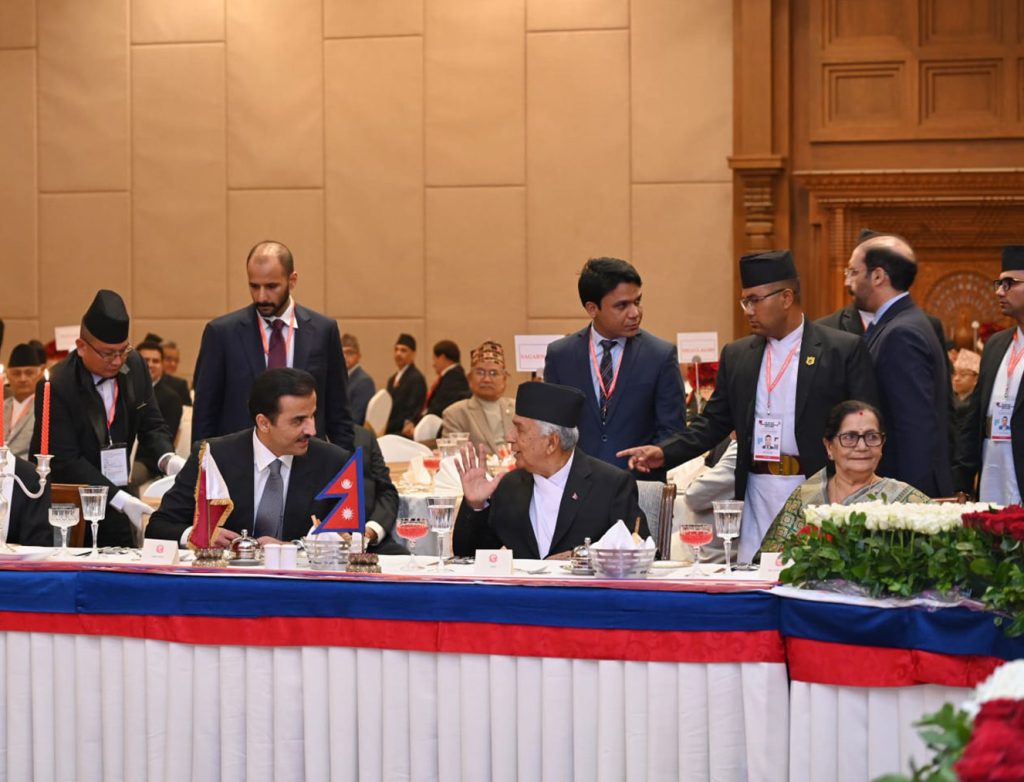
Qatar established its embassy in Kathmandu in 2011, while Nepal opened its Doha embassy in 2000. Nepali migrant workers began traveling to Qatar nearly two decades ago. Today, Qatar hosts approximately 400,000 Nepali workers. Nepal’s contribution to Qatar’s development was especially visible during the 2022 FIFA World Cup, where Nepali labor played a key role in infrastructure development.
Former Ambassador Bharadwaj stressed that Nepal has yet to fully capitalize on Qatar’s potential as a source of foreign direct investment (FDI). He added that Nepal also needs to prioritize cultural exchanges with Qatar, including tapping into benefits from the Qatar Sovereign Fund.
While there have been multiple visits from Nepal to Qatar, high-level visits from Qatar to Nepal have been limited. One of the earliest visits to Qatar by a top Nepali dignitary was in 1999, when Prime Minister Girija Prasad Koirala made an official visit.
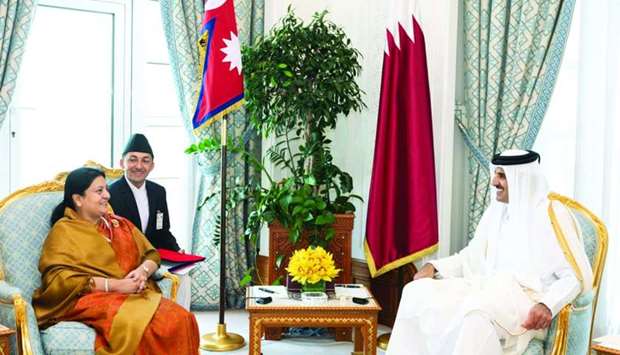
In 2018, President Bidya Devi Bhandari visited Qatar, following her predecessor, President Ram Baran Yadav, who visited in 2011. Speaker Krishna Bahadur Mahara visited in 2019. Former King Gyanendra Shah attended the second G-77 summit in Qatar in 2005, while the Late King Birendra made a private visit in 1999.
Qatari dignitaries who have visited Nepal include Labour and Social Affairs Minister Abdullah bin Saleh Mubarak Al Khulaifi (2015), Environment Minister Abdullah bin Mubarak bin Aboud Al Midhadi (2012), and Foreign Minister Sheikh Hamad bin Jassim bin Jabar Al Thani (2012).
The United Arab Emirates is one of Nepal’s significant partners in the GCC. Diplomatic relations were established in 1977, and the ties have strengthened over time. In April 2025, Sheikh Abdullah bin Zayed Al Nahyan, Deputy Prime Minister and Minister of Foreign Affairs, visited Nepal. During the visit, he met with President Ram Chandra Poudel and Prime Minister K.P. Sharma Oli.
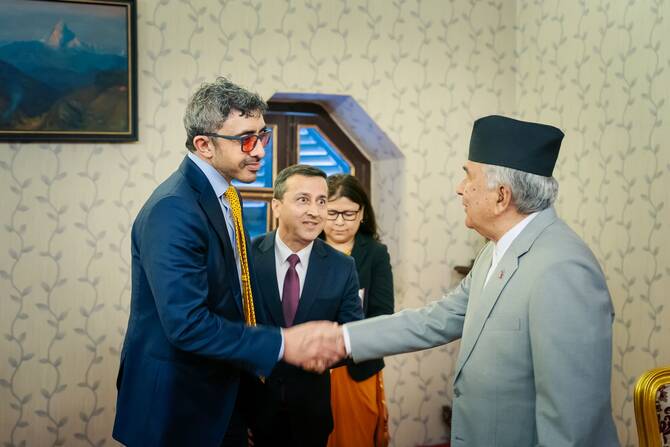
His meeting with Nepal’s Deputy Prime Minister and Minister for Urban Development, Prakash Man Singh, covered a range of mutual interests, including commerce, trade, tourism, aviation, and development. Sheikh Abdullah reaffirmed the UAE’s commitment to building partnerships that support sustainable development.
The meeting was attended by UAE officials including Ahmed bin Ali Al Sayegh, Saeed Mubarak Al Hajeri, Abdulla Balalaa, and UAE Ambassador to Nepal Abdullah bin Jarwan Al Shamsi.
More recently, Assistant Minister Abdulla Balalaa visited Nepal to participate in the Sagarmatha Sambaad, reaffirming the UAE’s commitment to inclusive climate diplomacy. At the forum, Balalaa highlighted the UAE’s USD 100 million pledge to the Fund for Responding to Loss and Damage (FRLD) at COP28.
With over half a million Nepali workers in the UAE, it remains Nepal’s largest labor destination in the Gulf.
Nepal’s Ambassador to the UAE, Tej Bahadur Chhetri, stresses the need to establish favorable conditions for attracting UAE investment. Agreements under discussion include Bilateral Investment Protection, Double Taxation, and a Bilateral Investment Agreement.
Saudi Arabia, under the dynamic leadership of Crown Prince Mohammed bin Salman, is one of the fastest-growing economies. It is undergoing fast changes under Vision 2030, an initiative launched in 2016 aimed at economic, social, and cultural diversification. It is also hosting the 2034 FIFA World Cup, and Nepal is expected to contribute largely to this with over 400,000 Nepali workers residing in the kingdom.
Nepal and Saudi Arabia established diplomatic relations on March 15, 1977. Over the years, these relations between the two countries have strengthened notably through the Saudi Fund for Development (SFD), to foster mutual understanding, cooperation, and growing economic ties.
Since the establishment of bilateral ties, officials of both countries have engaged in diplomatic visits.
Prince Faisal bin Farhan Al Saud’s 2022 visit to Nepal included meetings with the President, Prime Minister, and the Foreign Minister. A general cooperation agreement was signed between the two foreign ministries.
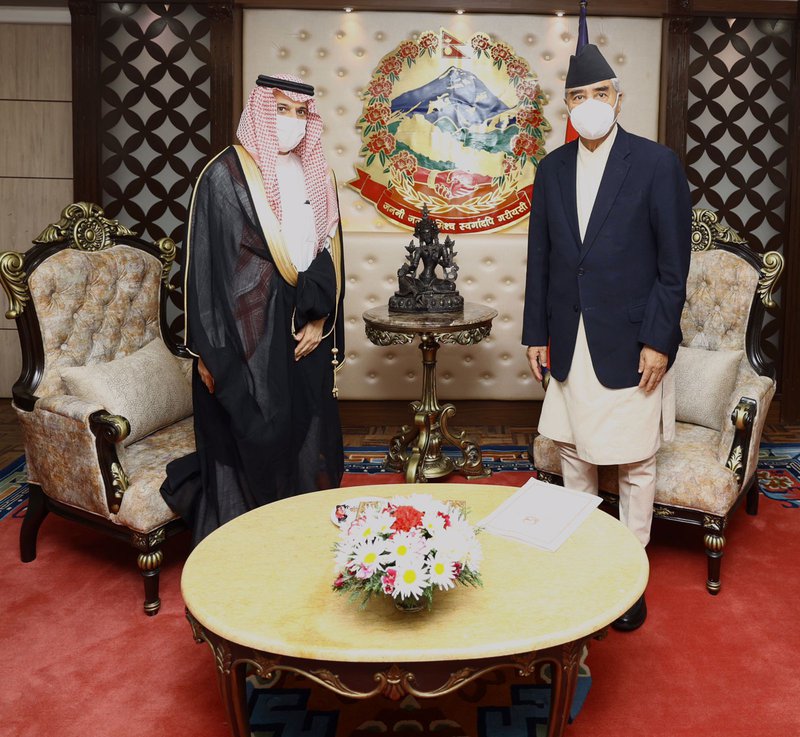
Prior to that, Prince Alwaleed Bin Talal Bin Abdulaziz Al-Saud visited Nepal in November 2010.
In 2019, the Vice Chairman of the Saudi Fund for Development visited Nepal, where a NRs. 3.3 billion loan assistance package was signed. Previously, a Saudi delegation had arrived in Kathmandu in 2011 for a three-day official visit.
Nepal’s Ambassador to Saudi Arabia, Dr. Naresh Bikram Dhakal, stressed the need for more high-level exchanges and a stronger focus on economic and cultural cooperation.
“Nepal needs to streamline labour recruitment with all the countries and shift her relations to economic and development mode,” he added. Like other experts, he too stated that Nepal needs to focus on a suitable market environment to attract investment and tourism from Saudi Arabia. Dr. Dhakal also underscored the export potential of Nepali products like woolen shawls, herbs, and food items to the Saudi market.
With diplomatic relations tied up in 1972, Kuwait has been an important partner of Nepal in the Gulf for decades. One of the major labour destinations in the Gulf, Kuwait, has welcomed around 100,000 Nepali migrant workers.
In September 2024, Prime Minister K.P. Sharma Oli met with Kuwait’s Crown Prince and Prime Minister Sheikh Sabah Khaled Al-Hamad Al-Mubarak Al-Sabah during the UN General Assembly in New York. At the meeting, they discussed a range of issues including labour, trade, tourism, and investment.
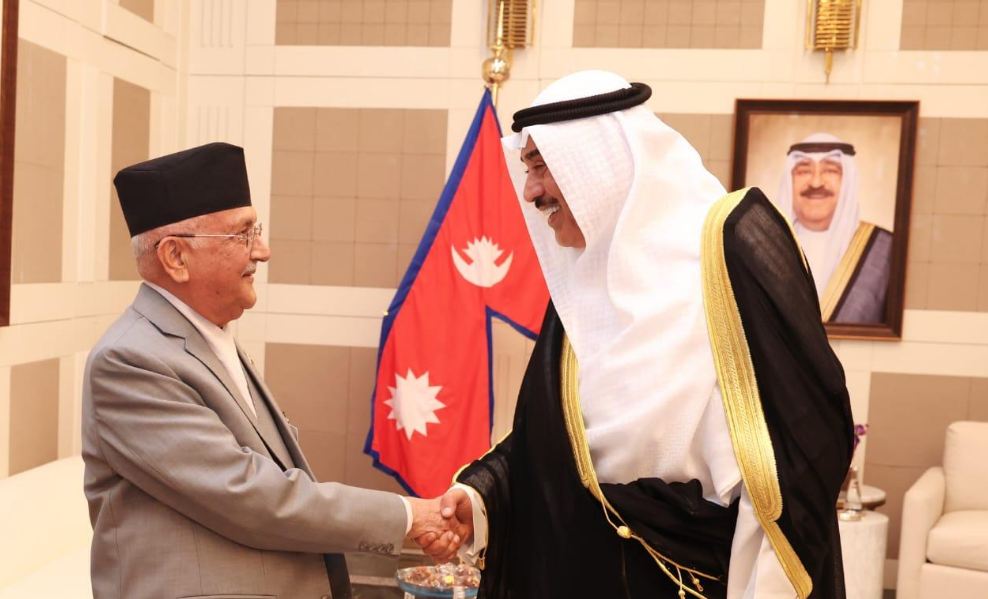
Earlier in 2021, Minister for Foreign Affairs Dr. Narayan Khadka held bilateral talks with his Kuwaiti counterpart Sheikh Dr Ahmed Nasser Al-Mohammed Al-Ahmed Al-Jaber Al-Sabah on the sidelines of the 76th session of the UNGA. During the meeting, the two sides expressed common interest in various issues, including the promotion of migrant workers, tourism, trade, and investment.
Diplomatic ties between Nepal and Bahrain were established on January 13, 1977, marking an era of cordial relations between the two nations. Nepal has a labour agreement in place with Bahrain, along with the UAE and Qatar in the Gulf region. While Nepal opened its embassy in Manama in 2013, Bahraini ambassadors are concurrently accredited from New Delhi.
In June 2024, Dr. Abdullatif bin Rashed Al Zayani, the Bahraini Minister of Foreign Affairs, met with Nepal’s Deputy Prime Minister and Minister of Foreign Affairs Narayan Kaji Shrestha, on the sidelines of the Asian Cooperation Dialogue (ACD) in Tehran. During the meeting, they reviewed bilateral relations between the two countries and discussed ways to enhance cooperation across multiple sectors.
Earlier, in 2024, Foreign Minister Narayan Prakash Saud met his counterpart, Dr. Abdullatif bin Rashid Al Zayani, on the sidelines of the 19th Non-Aligned Movement Summit in Kampala, Uganda. During the meeting, the two sides reaffirmed mutual interest in strengthening political and economic cooperation. Bahrain has for long been viewed as a potential source of investment and tourism for Nepal.
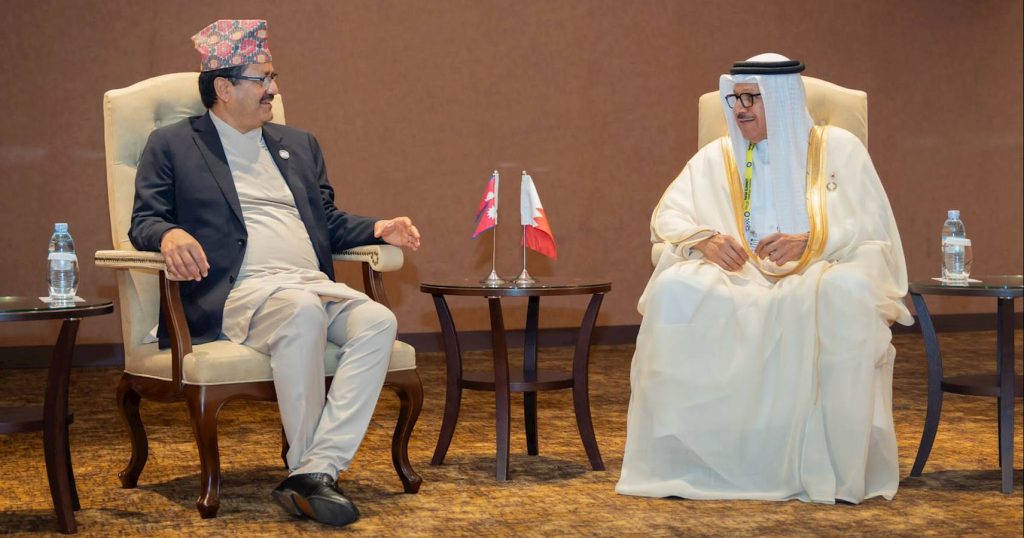
Nepal established diplomatic ties with the Sultanate of Oman on January 21, 1977, marking the beginning of a cordial and evolving relationship. Over the years, Oman has welcomed around 35,000 Nepali migrant workers, contributing significantly to both Oman’s workforce and Nepal’s remittance economy. While labour migration remains a foundational aspect of bilateral engagement, the two countries are increasingly diversifying cooperation across strategic sectors.
In August 2024, Oman’s Foreign Minister Sayyid Badr bin Hamad bin Hamood Albusaidi paid an official visit to Nepal, underscoring the deepening ties between Nepal and the Gulf region. During his visit, he held high-level talks with Prime Minister KP Sharma Oli and other senior officials. The two sides explored cooperation in tourism, mining, agriculture, and cultural exchanges, while also emphasizing the importance of joint investments and technical expertise exchange.
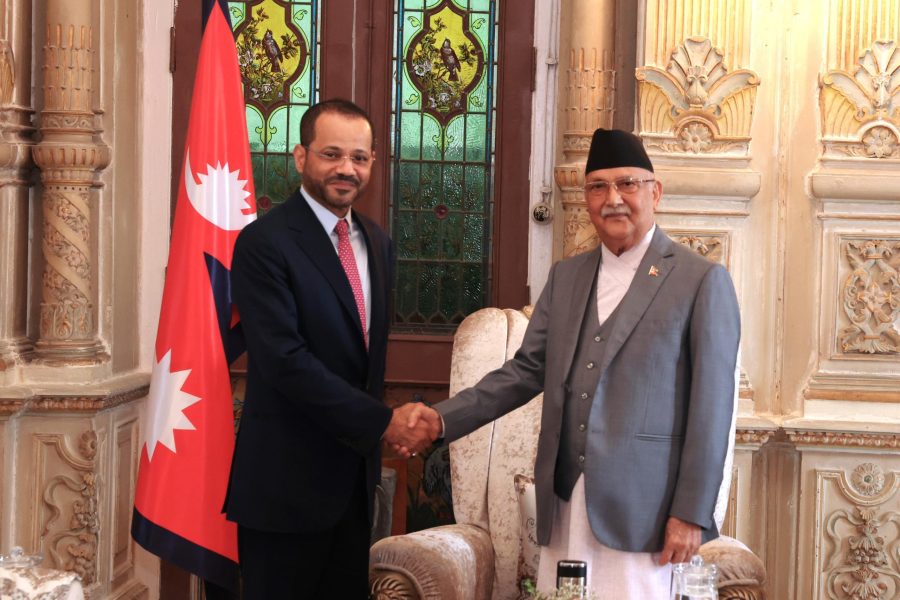
In a reciprocal visit, Nepal’s Foreign Minister Dr. Arzu Rana Deuba traveled to Oman in February 2025 and met with key Omani ministers, including Foreign Minister Sayyid Badr Albusaidi, Minister of Energy and Minerals Eng. Salim bin Nasser Al Aufi, and Minister of Heritage and Tourism Salim bin Mohammed bin Said Al Mahroqi.
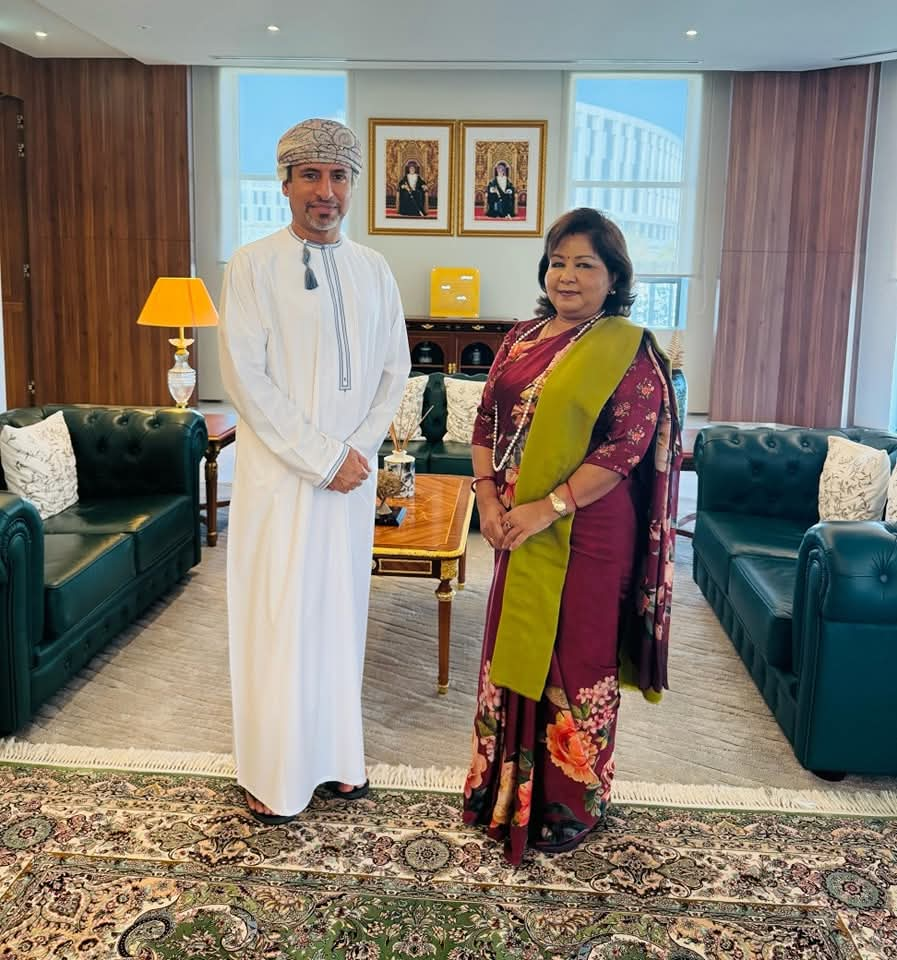
During the visit, Nepal highlighted its strategic priorities in clean energy – notably in hydropower, solar, wind, hybrid technologies, and green hydrogen development. The two sides agreed to collaborate closely in the energy and tourism sectors, and a Memorandum of Understanding (MoU) was signed between Nepal’s Ministry of Culture, Tourism, and Civil Aviation and Oman’s Ministry of Heritage and Tourism.
Nepal can also benefit immensely from Oman’s technological know-how in hydrogen production, green energy storage, and energy efficiency systems. Oman’s growing expertise in sustainable and innovative energy solutions offers valuable learning and partnership avenues for Nepal as it strives to position itself as a hub for green energy in South Asia.
In September 2017, Prime Minister Sher Bahadur Deuba visited Oman, further reinforcing bilateral engagement and opening avenues for cooperation beyond traditional labour relations.
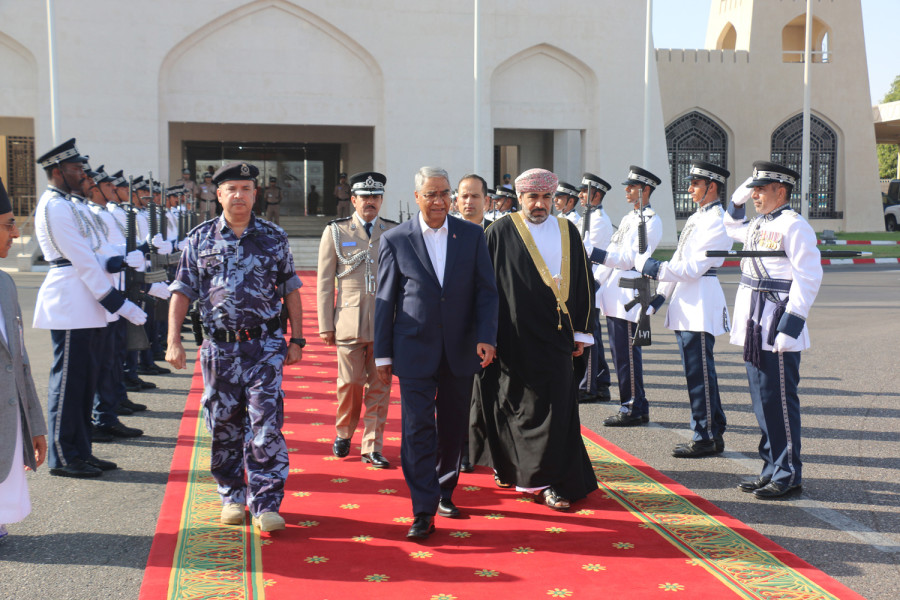
Dr. Sarmila Parajuli Dhakal, Nepal’s first resident ambassador to Oman, played a pivotal role in laying the groundwork for enhanced diplomatic relations. She has consistently advocated for Nepal to reimagine its relationship with Oman and other GCC countries not merely as labour destinations, but as potential strategic development partners.
“Nepal can collaborate with Oman in energy, fertilizer, tourism, investment, and trade. To benefit from the Gulf countries, Nepal must build trust, ensure an investment-friendly environment, and engage with them beyond just the labour sector,” she noted.
She further emphasized the growing importance of the Gulf countries in Nepal’s long-term development vision, stating, “The changing global dynamics demand that Nepal view the Gulf as a source of sustainable development partnerships. It is in Nepal’s interest to capitalise on this momentum for economic growth and shared prosperity.”
As Nepal witnesses a surge in technology adoption and youth engagement in digital skills, information and communication technology (ICT) has emerged as a critical frontier for collaboration. With a young, tech-savvy population and increasing digital literacy, Nepal provides a fertile base for tech partnerships, innovation hubs, and startup ecosystems.
The GCC region, particularly Oman, with its Vision 2040 strategy, is focusing on diversifying the economy beyond oil by investing heavily in smart technologies, e-governance, and digital infrastructure.
This presents a timely opportunity for Nepal and Oman to align in areas such as: Joint ICT skill development programs, Digital entrepreneurship exchanges, Establishment of tech incubators and coding academies, Partnerships in cybersecurity, cloud services, and digital governance, and Green technology transfer and innovation in climate-smart solutions.
Nepal can also benefit from Oman’s experience in developing digital public services and resilient tech ecosystems, enhancing Nepal’s own digital governance and e-services for citizens and businesses.
Beyond bilateral efforts with Oman, Nepal has the potential to build broader ICT partnerships across the GCC region. As countries like the UAE, Qatar, and Saudi Arabia also diversify into technology-driven economies, Nepal can offer its digitally literate youth, cost-effective services, and startup potential as an attractive partner.
A well-coordinated Nepal-GCC tech alliance could foster: workforce mobility in the tech sector, smart city development collaboration, joint research and innovation projects, and remote service partnerships in AI, data analytics, fintech, and healthtech.
Investing in these forward-looking areas will not only unlock new opportunities for Nepal’s youth but also solidify long-term diplomatic and economic ties between Nepal and the Arab world.
Another Former Ambassador to Qatar, Surya Nath Mishra, echoed similar views. “We need to prioritize economic diplomacy with GCC countries. Economic diplomacy encompasses various sectors, including employment, international trade, tourism, transportation, banking, warehousing, among other sectors,” Mishra said.
He added, “Until now, Nepal has remained a labour-sending nation to the wealthy GCC countries. It is time to shift that perception and create a welcoming environment for broader investment.”